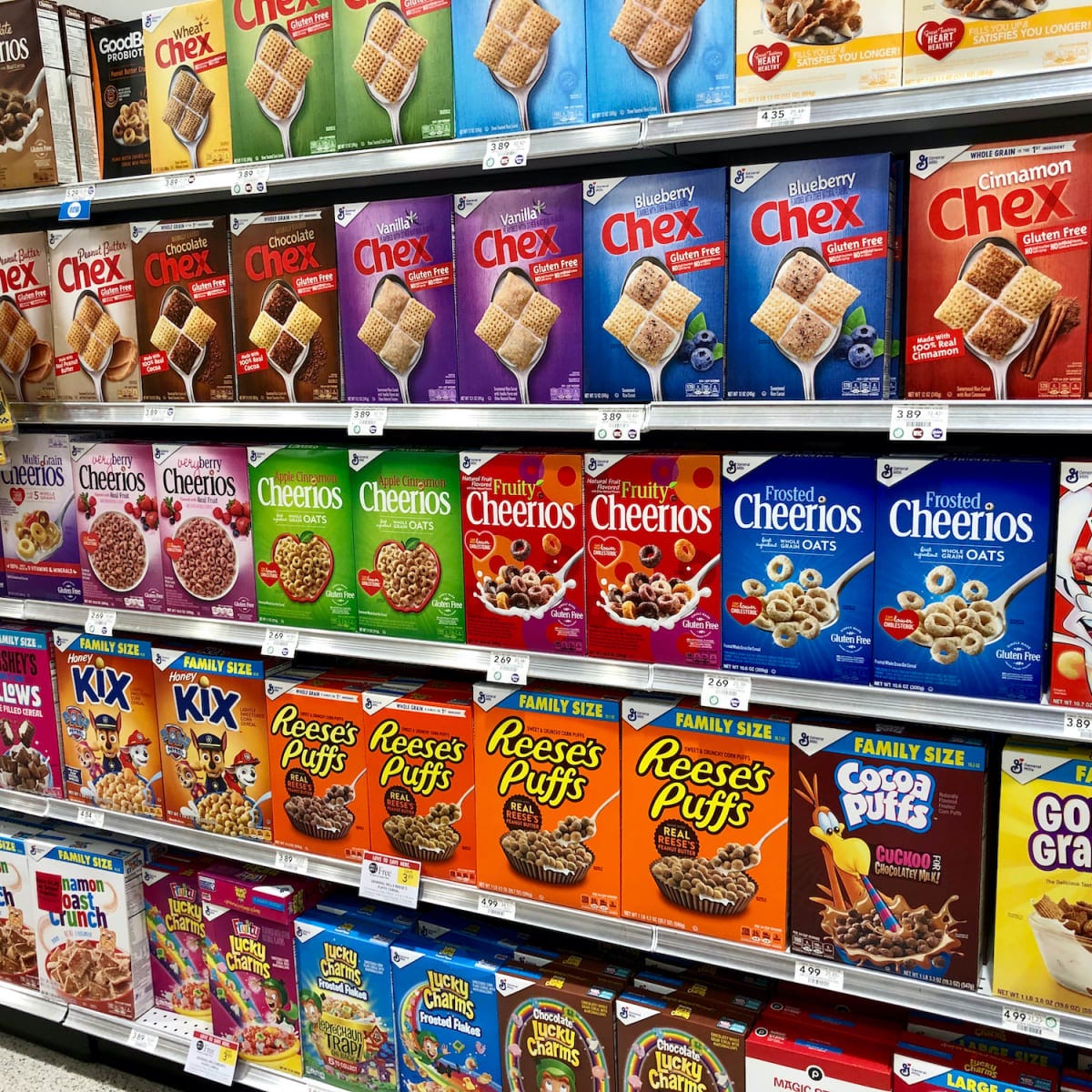Welcome to the New Natural
Boomer Capitalism has poisoned our bodies and minds for 3/4 of a century. It's time for a new approach.
The consumer goods industry has spent the past 75 years getting very good at making a ton of stuff.
Every category, from food, to cosmetics, to clothing, to furniture, is flooded with thousdands of brands selling millions of products.
But there’s a problem: they all harm our health.
It need not be this way. And times are changing. What I like to call The New Natural is taking its place.
Paradox of Choice
The sheer number of choices in a modern store is both alluring and intimidating. After all, with so many options, how do you know which one is the best?
The answer is simple: they’re all bad.
Full of hormone disrupting chemicals and low-quality synthetic materials, none of it is fit for consumption by even our worst enemies.
This is Boomer Capitalism—use the vast wealth of modernity to make the worst products you can imagine, and as long as every company does the same thing, no one will notice.
But New Natural capitalists are starting a new generation of businesses that do things very differently. And people are starting to notice.
In this article, we’ll look at what these brilliant businesses are doing right and why this spells the end for Boomer Capitalism.
The World as it is Today
But first, how did we get here?
In olden times, if you sold poison as medicine to your fellow villagers, you would be lynched or chased out of town, never to return.
Making such low quality, toxic products would never fly back in the day. So what happened?
Industrial Technology and its Consequences
Two features of industrial technology changed the game:
Long distance transportation, and
Mass communication
As businesses grew and began making and selling their products over a larger area, their harmful effects become dispersed. This made it harder for companies to face any meaningful consequences for bad action.
Instead of some guy in a workshop down the street to whom you could bring your grievances, you as the customer are up against a behemoth conglomerate with no one for you to talk to and no accountability.
Even if people did start to notice, corporates could buy the favor of public opinion using centralized mass media that they largely paid for.
Kick and scream all you want, but no one will pay attention to you. And so business carries on as usual.
The opportunity for abuse is obvious. Freed of the burden of consequences for their actions, industry became a race to the bottom of cost and convenience, to the detriment of everything else.
As the shortcuts piled up and the harmful influences accumulated, it also became impossible to single out a specific cause of a particular effect in a court of law, so corporates keep getting away with using harmful chemicals and the damages they cause.
It’s everyone’s fault, and so it’s no one’s fault.
This sums up the state of capitalism today. Distance and centralized media allow companies to shirk responsibility for the consequences of their actions.
However, times are changing.
Two Way Communication
Web 2.0 turned on two-way communication for the first time in hundreds of years: our opinions once again matter, as the “untouchable” institutions of yesteryear are placed shoulder-to-shoulder with any random anonymous twitter account.
They can’t hide in 1950s newsrooms behind vetted anchors— public opinion is there for the world to see.
Just like the small old-world village where you can talk to your neighbors about the overreach of a particular craftsman and collectively decide to put a stop to it.
Having come full circle, it’s time for companies to start taking responsibility for their products again.
And that’s how we get to anti-synthetic capitalism, with the many (and growing) examples of businesses doing things right and doing it very publicly.
While it’s still early, we keep seeing artificial brands fail, and new natural brands are wild successes. The modern consumer knows too much at this point, and they won’t suffer nature to be co-opted when other options are available to them.
Nature, co-opted
It’s important to note that this analysis isn’t specifically about age. There are plenty of old people who value nature and truth, and plenty of young people who act like boomers.
But most of the trends discussed here came to be under the supervision of the boomers.
And for boomers, “natural” is thrown around so callously and frequently that it has lost all meaning.
Ironic that the hippie generation got Nature completely wrong.
They’ll pay lip-service to “nature” while literally spending thousands of dollars a year to poison their own groundwater and local wildlife to genocide naturally occurring flowers (i.e., dandelions) into oblivion so that their .5 acres in the suburbs looks like a golf course.
They require plastic jugs filled with 30 different chemicals to remove the naturally occurring oils and pheromones from their skin. But they are all scented with toxic fragrance that smells like the ocean breeze or a field of wildflowers, which seems “natural” enough.
And they will squander millions of dollars of the next generations’ inheritance on the most advanced medical technology in the last years of their lives in an ill-fated attempt to put a stop to the one inescapable fact of nature to which we are all subject: death.
This of course after a lifetime of binging eat Doritos, drinking the cheapest beer, and convincing an entire generation to get hopped up on hormonal birth control SSRIs.
Their ways of doing business are exactly like they are: strictly opposed to nature.
Boomer capitalism abuses nature in three main ways:
Short-sightedness
Artificiality
Homogeneity
Fortunately, nature always wins. The dandelions WILL return! Let’s took a look at each failure, and then discuss what the New Natural does better.
Short-sightedness
One of the hallmarks of synthetic capitalism is also one of the most obviously synthetic principles in existence: unending exponential growth.
Inheriting a post-war order that was only one generation old, and titilated by the promises of electronic technology that they didn’t understand, boomers seemed to pay no attention to the long term consequences of their businesses.
Instead of using the measured consideration that the stewards of an advanced and historical civilization should, they treated it like it was brand new— an experiment if you will, just like the experiments that brought them their shiny toys like birth control and TV.
But in nature, things grow, and then they slow down and plateau or recede. This is great, normal, and a natural part of life.
On the contrary, exponential growth does not exist in materiality, it cannot exist.
To even try suggests a failure to understand nature. And thus it’s no surprise that the need for unending growth led to artificial practices at every level of enterprise.
Artificiality
The desire to achieve such an unrealistic goal encourages irresponsible decision-making that requires artificiality to work.
Simply put, to grow forever, you need to make more stuff, and make it more efficiently. Doing so always requires fake stuff.
Example. Is the stuff made of wood?
Cool, let’s chop down the trees. Oops, there are no more trees left! And they take too long to grow.
So how about plastic? Awesome! It doesn’t decompose for 1,000 years? Maybe we should reuse it?
Nah, that takes too long too. More new plastic!
And so it goes, until we are swimming in a sea of macro and microplastics.
Thus we must attempt to create entirely new substances and technologies which, when mixed with our fixed biology, create a disconnect that leads to the “man-made horrors beyond our comprehension” that surround us.
But artificiality isn’t enough. To grow the most and the fastest, everything must be the same.
Homogeneity
It’s much too inefficient to have a different bakery in every town. Makes more sense to just have one, right?
But the same bakery in every town selling the same products requires the same inputs, despite the fact that there are idiosyncracies in the land, farming, and consumption patterns in different places.
In Italy, there are dozens of styles of bread in every single province that you can’t find elsewhere.
In Walmartville, USA, we only have one or two.
In France, there is a different cheese for every town. But if left up to the boomers, we’d only have Kraft singles.
Thus everything becomes the same— the same crap.
This crap is not only artificial and toxic, it’s horrifically ugly. And the fact that it needs to be forced into every nook and crannie of commerce around the country and world makes it even worse.
The New Hero
Instead, anti-synthetic capitalism includes natural principles at its core.
But what does that mean, in a world where “natural” has lost all meaning?
The best definition I have is simple:
A product is natural if it can be made without electricity or the industrial infrastructure built on top of it.
Example: MASA Chips, which my company makes.
We could make them with a campfire, a knife, and a cast iron cauldron.
Not that we’d want to— they’re expensive enough as it is.
But we could. And that’s the point.
Another example is tallow-based cosmetics, like soaps, balms, etc.
Yes, production benefits from large stainless steel mixers and boilers, but such equipment is not strictly necessary.
For clothing? Well, there are plenty of natural fabrics that humans have produced for millennia. And sewing is one of the oldest manufacturing techniques out there.
And what’s the result?
We make things that take time to grow, and don’t try to push them past their inherent limitations.
We don’t take shortcuts. We use the best things we have access to, in a way that allows them to be available for generations to come.
And every product is slightly different. Natural variation is appreciated, not eliminated.
And people are eager to buy them.
In short, the true underlying principles of nature are respected and valued not as enemies to overcome but assets to work with.
While we ruthlessly respect nature, we don’t despise technology. In fact, none of this would be possible without the internet and the communication, marketing, and operations it fosters.
It’s just that tech doesn’t belong in the product itself (in the form of synthetic chemicals, materials, and additives).
Instead, where the past used tech where it didn’t belong to hit goals it should have never sought to achieve, we use tech in a way that helps us run a business without infecting the products themselves.
Conclusion
Instead of seed oils, we use beef fat.
Instead of synthetic fertilizers, we use cow manure.
Instead of polyester, we use organic cotton, linen, and leather
Instead of plastic, we use wood and metal.
Instead of “natural flavors”, we use actual spices and quality ingredients
While all of the boomer capitalism versions of these things are fake, toxic, and undignified, Nature, it turns out, had it right all along.
It’s quite interesting that in most categories, the “luxury” industry got it right. Duck fat fried potatoes at upscale French restaurants, handmade hardwood furniture, and cashmere sweaters are all products that meet the standards of the New Natural.
In the same way as the luxury houses of France have been riding a massive demand wave over the past 30 years that defies all expectations, the New Natural represents the next major innovation in commerce. Quality, but ultimately for everyone. The brands practicing it are succeeding, while legacy brands are dying.
And the most interesting thing is that we’re not inventing anything new, but merely re-discovering the old.








Thank you! Remember that not all ingredients are created equal. Pesticide conventional corn is not the same as organic nixtamalized corn, etc.
Really excellent article Tan Man. I'd written a note in my journal a few times lately on the idea that the boomer generation had looted the whole world for their benefit, but did not begin to put it all together as well as you have here.